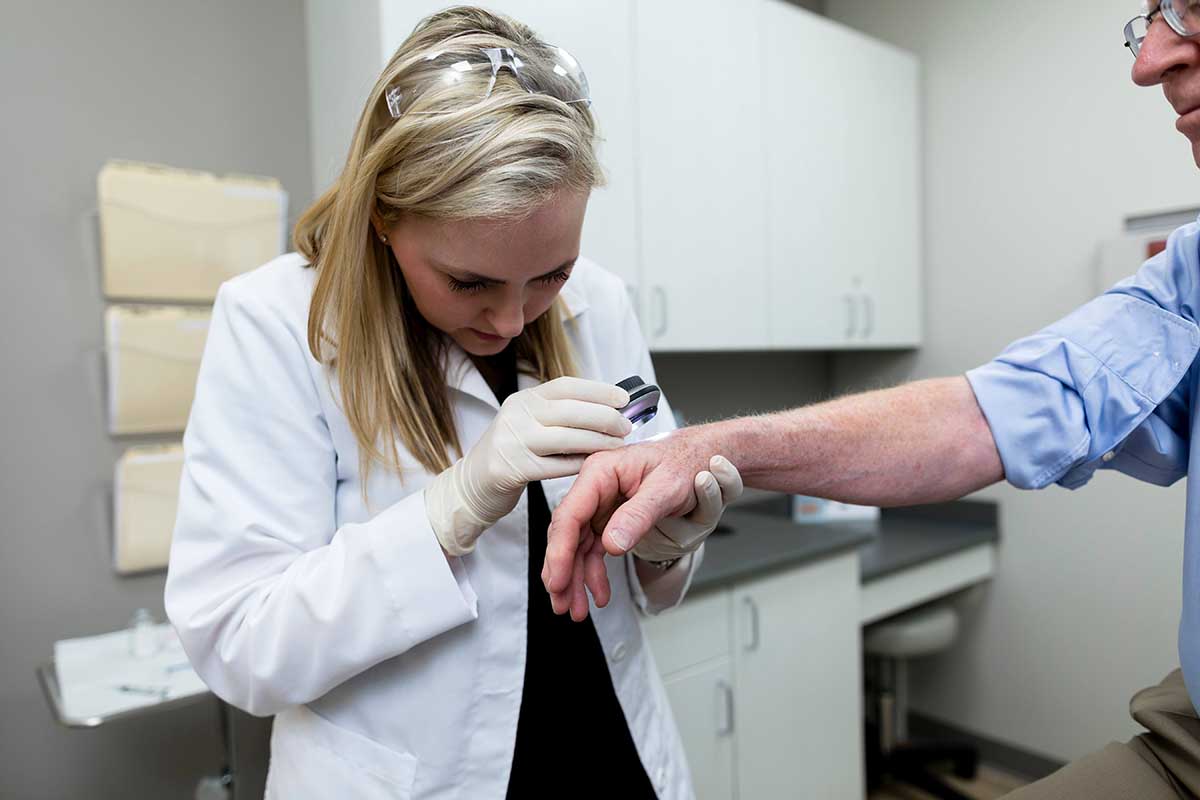MELANOMA SKIN CANCER TREATMENT FOR BELLEVUE
Due to the large number of people that experience some form of skin cancer, receiving regular skin exams is an important way to detect skin cancer or abnormalities early on. The earlier skin cancer is detected, the easier it is to treat and the less damage is done to the body. Whether skin cancer is prevalent in your family, or you are just looking for some peace of mind, Physician Assistant Amy K. Price and Dr. Melanie Ortleb at MOD Dermatology near Bellevue offer full-body skin exams and skin cancer screenings.

WHO SHOULD CONSIDER SCHEDULING A FULL-BODY SKIN EXAMINATION?
We recommend a skin exam of your full body for those who are noticing a change in their skin including moles, sun spots, and other abnormal growths. Several other factors should cause one to consider getting an exam including someone with the following:
- Multiple sunburns
- Constant exposure to the sun
- Family history of melanoma
- History of precancerous areas, actinic keratosis, squamous cell carcinoma, or basal cell carcinoma
- Moles
- Use of tanning, both indoors and outdoors
WHAT TO EXPECT DURING A SKIN EXAM FOR BELLEVUE
A full body exam will consist of an examination of the skin from head to toe. At MOD Dermatology, we focus on the comfort of our clients. During your melanoma exam, our Bellevue area dermatologists will strategically cover each part of your body. Your dermatologist will use an instrument named a dermatoscope to examine the skin and look for any ambiguous moles or growths on the body. They will then decide whether to continue monitoring the affected area or perform a biopsy on the skin.
How to do a self-skin exam
Though receiving an annual skin cancer screening for Bellevue clients is highly recommended, it is also important to perform skin exams on yourself once a month. Especially for those who are at a higher risk for skin cancer, this can help you catch any signs of skin cancer early on.
Here’s how to perform a skin exam on yourself:
Go to a well-lit room in front of a mirror. Use a hand-held mirror to make it easier to see areas like the backs of your legs, neck, and torso. A close friend, partner, or family member can help you check the hard-to-see areas like your scalp.
Take note of the way your moles, freckles, and other spots are shaped, sized, and colored. Taking mental notes or photos can help you notice any changes that occur between exams.
As you begin your exam, start with your face, ears, neck, chest, and stomach. Then check your underarms, the front and back of your arms, the tops and palms of your hands, between your fingers, and under your fingernails. Make sure to check the skin underneath breasts and skin folds.
Sitting down, you’ll then check your legs, including the tops of your thighs, shins, feet, between the toes, and under toenails. Then, use your hand mirror to check the bottom of your feet, calves, and the back of your thighs.
Next, you’ll stand again and use the hand mirror to check your buttocks, genital areas, and lower back. You’ll also check the back of your neck, ears, and upper back—these areas can be easier to exam if you use your hand mirror to reflect in a larger wall mirror.
Finally, check your scalp in sections using a small comb.
What should I look for during a self-skin exam?
During your self-skin exam, here are a few things you will want to check for and make note of:
- Any moles, spots, or growths that have newly appeared or changed in size, shape, or color since your last exam
- A wound or sore that bleeds and doesn’t heal after several weeks
- A scaly, rough, or irritated patch that gets crusty or bleeds
- Any wart-like growths
- Moles that are asymmetrical, have uneven borders, are multiple colors, are larger than the size of a pencil eraser in diameter, or have evolved in size, shape, color, or other symptoms over time. A good way to remember these warning signs is “ABCDE,” standing for asymmetry, border, color, diameter, and evolving.
FULL-BODY SKIN EXAMS AND SKIN CANCER SCREENINGS NEAR BELLEVUE
Call 402-505-8777 to schedule a visit with any of our providers.




